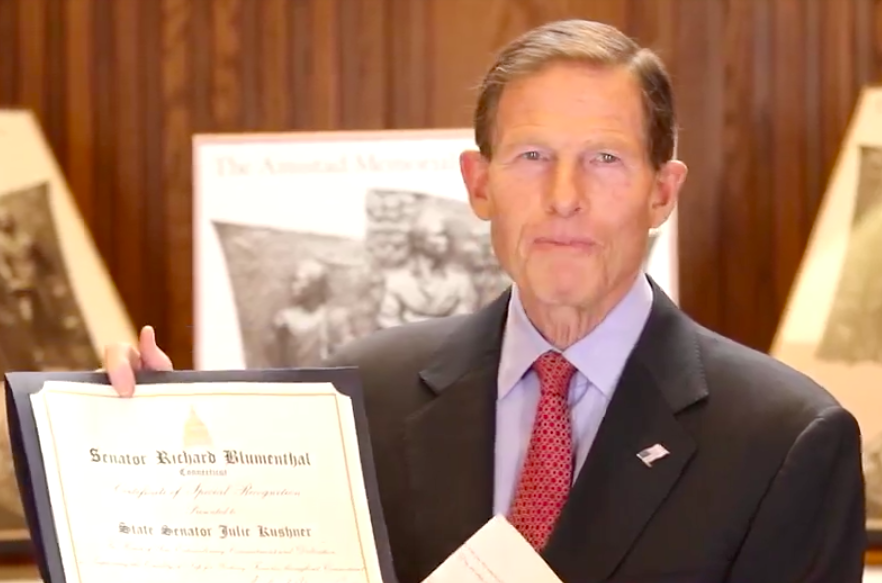Connecticut is currently considering a new regulation that aims to phase out the purchase of new gas-powered vehicles that aligns with California’s emissions standards. While debate has been divided, the regulation’s supporters point to the bipartisan support it received in 2004 when overwhelmingly passed by the General Assembly.
However, testimony from then-Atty. Gen. Richard Blumenthal suggests that lawmakers voted in favor of it due to inaccurate information at the time.
During the Environment Committee’s public hearing on Feb. 23, 2004, Rep. John Piscopo (R-76th) posed a question to Blumenthal about whether the federal government’s Clean Air Act might impact Connecticut’s ability to independently regulate air quality. Specifically, Rep. Piscopo inquired whether adopting California’s regulations or programs would bind Connecticut’s environmental decision to the Golden State’s, restricting the Constitution State’s ability to make future independent changes.
The Clean Air Act gives California the authority to set its own, more stringent vehicle emissions standards than those mandated by federal law. Additionally, the act gives other states the option to adopt California’s standards in lieu of the federal emissions standards.
Blumenthal’s response to Rep. Piscopo was: “I don’t think that we’re committed to follow California provision by provision. The standards are basically a choice between the Federal Tier II and the so-called California standard.”
Reassuring Rep. Piscopo, he went on to say, “We would not be bound by every change made by California.”
Rep. Brendan Sharkey (D-formerly of the 88th) sought further clarification, echoing concerns raised by constituents that “if we adopt the legislation, we’ll essentially be sort of slavishly following whatever California decides to do. They’re essentially the dog and we’re the tail and we have to wag to their commands.”
Blumenthal responded, “No state could bind another state as a matter of constitutional principle. The only sovereign entity capable of binding Connecticut is the federal government.”
Taking Blumenthal’s testimony into account, the committee ultimately approved the bill with a vote of 24-1, with Rep. Piscopo casting the sole dissenting vote. Subsequently, the bill received unanimous support in the Senate passing 36-0. It then was sent to the House, where it easily passed 143-1, with Rep. Piscopo once again casting the lone dissenting vote.
In reference to the 2004 vote, Sen. Christine Cohen (D-12th) issued a statement on Aug. 16 where she highlighted, “Both Democrats and Republicans in the General Assembly saw the near-unanimous passage of ‘An Act Concerning Clean Cars,’ by which we agreed to adopt light-duty emissions standards promulgated by the State of California. We all agreed to that, Democrats and Republicans alike. The bill was signed into law by Gov. John Rowland.”
In reality, what was agreed upon was the flexibility to select which provision to adhere to, as then-Atty. Gen. Blumenthal had emphasized. Put another way, this meant that Connecticut was not obligated to conform to “every change made by California” including banning the sale of gas cars.
On Aug. 22, the Department of Energy and Environmental Protection (DEEP) held a public hearing concerning the 2035 ban on gas-powered cars. They also received thousands of written testimonies from the public representing both support and opposition to the proposal.
The comment period concluded on Aug. 30, and DEEP is currently drafting a written report that includes responses and approval from the state Attorney’s General office. Following this approval, the determination of approval of the regulation is in the hands of the Legislative Regulation Review Committee — a joint bipartisan committee made up of 14 members: six senators and eight representatives with an equal amount from each party.
On the national scene, in response to California’s decision to prohibit the sale of new gas cars, the U.S. House of Representatives passed a bill 222-190 on Thurs. (Sept. 14) to amend the Clean Air Act to prevent states from imposing bans on gas-powered vehicles. It is now awaiting a vote from the Senate.

